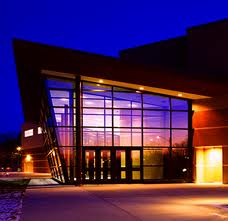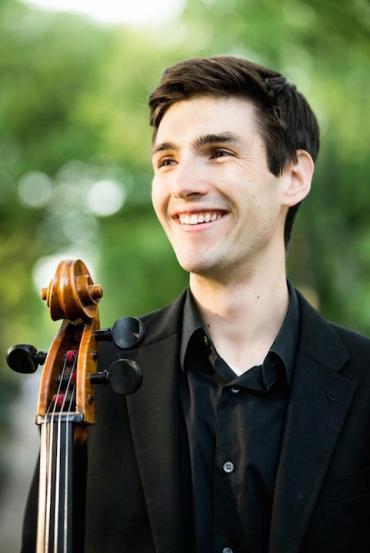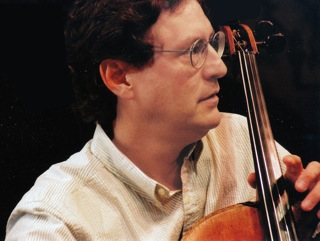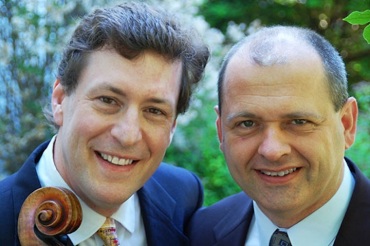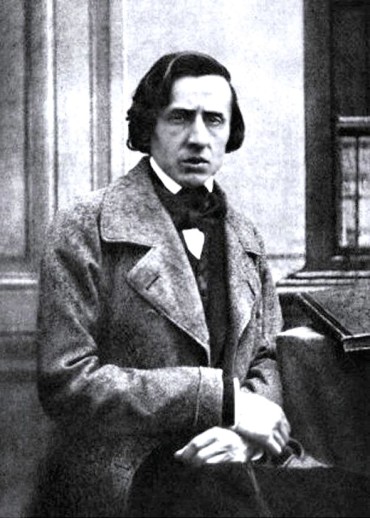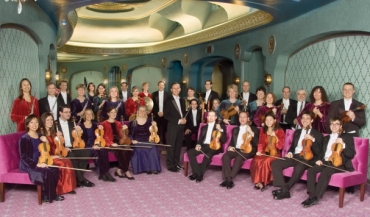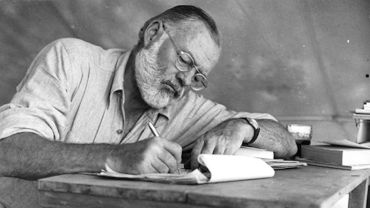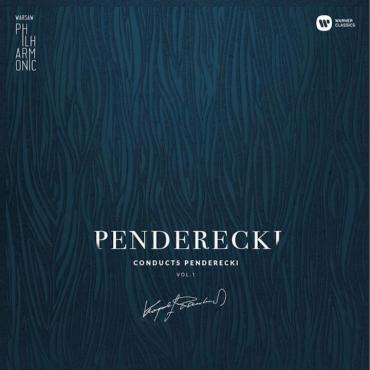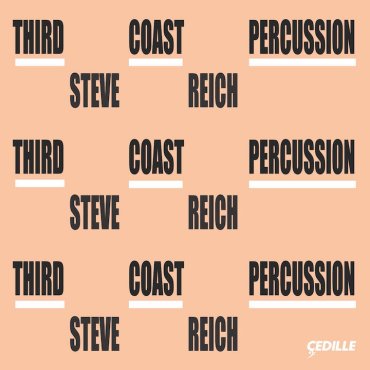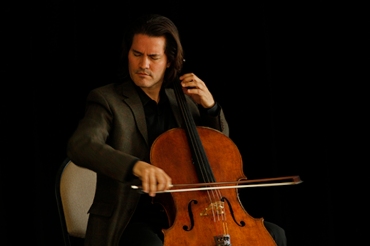The Well-Tempered Ear
Classical music: Middleton Community Orchestra and UW-Madison cellist Andrew Briggs perform music by Mendelssohn, Rossini and Dvorak this Wednesday night. Also, University Opera’s David Ronis discusses Benjamin Britten’s “The Turn of the Screw” at noon on Wisconsin Public Radio
Leave a Comment
ALERT: Today at noon on Wisconsin Public Radio’s “The Midday,” host Norman Gilliland will interview artistic director David Ronis about the University Opera’s production of Benjamin Britten’s “The Turn of the Screw,” which will be performed this Friday night, Sunday afternoon and next Tuesday night.
By Jacob Stockinger
The mostly amateur Middleton Community Orchestra (below, in a photo by William Balhorn), under the baton of Steve Kurr, will perform the winter concert of its seventh season on this Wednesday night, March 1, at the Middleton Performing Arts Center at 7:30 p.m.
The Middleton PAC is attached to Middleton High School and is attached to Middleton High School.
General admission is $15. Students are admitted free of charge. The box office opens at 6:30 p.m. and the auditorium doors open at 7 p.m.
The program includes the “Turk in Italy” Overture by Gioachino Rossini; “Silent Woods” and Rondo in G minor, two rarely performed cello pieces by Antonin Dvorak; and the Symphony No. 5 (“Reformation”) by Felix Mendelssohn. (You can hear Dvorak’s “Silent Woods,” with cellist Yo-Yo Ma and Seiji Ozawa conducting the Boston Symphony, in the YouTube video at the bottom.)
Cello soloist Andrew Briggs (below), is returning to perform with the MCO for a second time.
You can hear last season’s performance of the Dvorak cello concerto by Briggs with the MCO here: https://www.youtube.com/watch?v=3wc1WLWhtb4
Briggs (below) is completing his doctorate at the University of Wisconsin-Madison this spring, so this may be your last chance to hear him in Madison.
SOMETHING NEW
This concert will open with a special guest, Middleton Tribune writer, Matt Geiger who will read two short stories from his new book (below).
Here is a sample from the cover of this book collection: “His little sister joins the circus. His parents buy a nerdy horse. He’s surrounded by hundreds of men dressed up as Ernest Hemingway. He tries to order a monkey through the mail. And now his baby is eating dog food.”
Matt Geiger’s award-winning stories reveal the sublime in the mundane and the comical in the banal. There is existential dread. There is festivity amid detritus. There are moments of genuine introspection on what it means to be human. And it’s all laugh-out-loud funny when told by a humorist who is determined to live an examined life, even if he’s not always entirely sure what he’s looking at.
Matt Geiger (below) was born in Brunswick, Maine, in 1979. He studied philosophy and religion at Flagler College and went on to write for newspapers and magazines in Florida, Wisconsin and the United Kingdom. He is the winner of numerous journalism awards. He currently lives in Wisconsin with his wife, his daughter, two dogs, a cat and a flock of chickens.
As always, there will be a FREE reception for the musicians and the audience after the concert.
For more information about the Middleton Community Orchestra, including its upcoming concerts and review as well as how to join it and support it, go to: http://middletoncommunityorchestra.org
Tags: Andrew Briggs, Arts, audience, award, baby, Boston Symphony, Cello, circus, Classical music, comical, concerto, doctorate, drread, Ernest Hemingway, existential, Flagler College, Florida, Gioachino Rossini, horse, human, Humor, introspective, Italy, Jacob Stockinger, journalism, Madison, Maine, Matt Geiger, Middleton, Middleton Community Orchestra, Middleton High School, Middleton Performing Arts Center, Middleton Tribune, monkey, mundane, Music, Musician, Orchestra, Overture, parents, reception, Reformation Symphony, rondo, Seiji Ozawa, short story, Silent Woods, sister, symphony, Turk, UK, United Kingdom, United States, University of Wisconsin-Madison School of Music, University of Wisconsin–Madison, Wisconsin, Wolf, wolves, Woods, Yo-Yo Ma, YouTube
Classical music: Does movie music qualify as classical music? Edgewood Chamber Orchestra concert this afternoon has been CANCELLED
4 Comments
ALERT: The concert by Edgewood Chamber Orchestra scheduled for 2:30 p.m. today — Sunday, Feb. 26 — has been CANCELLED. The cancellation was caused by a heating issue in the performance venue. The Chamber Orchestra’s season will continue with its next performance on Sunday, April 23, 2017.
By Jacob Stockinger
The Oscars (below) will be given out this Sunday night at 7:30 p.m. CST on ABC-TV.
Around the nation and the world, more and more symphony orchestras and chamber music groups are turning to performing movie music to attract new audiences — and to explore new repertoire.
And that includes the Madison Symphony Orchestra.
Two seasons ago, acclaimed British violinist Daniel Hope soloed with the MSO to explore movie scores by exiled European composers including Franz Waxman, Miklos Rozsa and Erich Wolfgang Korngold.
This past fall, the MSO put the Chaconne from the film “The Red Violin,” composer by John Corigliano, on the opening program of this season. And this summer, the MSO will perform music by John Williams used in the Harry Potter films.
This morning from 10 a.m. until noon, Wisconsin Public Radio will use the listener’s choice program “Classics By Request” to air its annual Salute to the Oscars that includes past film scores and those up for Academy Awards this year.
So this seems a great time to raise the question: “Do film scores qualify as classical music”?
The question was recently debated for Gramophone magazine by the critic Jed Distler and two distinguished contemporary composers who have written for the concert hall and for Hollywood: Philip Glass (below top) and John Corigliano (below bottom).
It is a fascinating discussion that may surprise you. One great crossover example that The Ear loves is the String Quartet No. 3 by Philip Glass, which is based on the same composer’s full score for the film”Mishima.” (You can hear the last movement in the YouTube video at the bottom.)
Here is a link to that discussion:
https://www.gramophone.co.uk/feature/debate-when-is-film-music-classical
Don’t forget to leave your favorite movie score and what you think about movie music and classical music in the COMMENTS section.
The Ear wants to hear.
Tags: ABC, Academy Award, Arts, audience, Britain, British, chaconne, Classical music, Compact Disc, composer, concert hall, concerto, Daniel Hope, English, Erich Wolfgang Korngold, fall, film, Franz Waxman, Gramophone (magazine), Harry Pottter, Hollywood, Jacob Stockinger, Jed Distler, John Corigliano, John Williams, Madison, Madison Symphony Orchestra, Miklos Rozsa, Mishima, movie, Music, nation, Orchestra, Oscar, Philip Glass, Red Violin, repertoire, salute, score, Season, soundtrack, String quartet, summer, symphony, Television, TV, UK, United Kingdom, United States, University of Wisconsin-Madison School of Music, University of Wisconsin–Madison, Violin, Wisconsin, wisconsin public radio, YouTube
Classical music: Edgewood College Chamber Orchestra performs Sunday afternoon. Plus a FREE violin recital is this Friday at noon
1 Comment
ALERT: This week’s FREE Friday Noon Musicale at the First Unitarian Society of Madison, 900 University Bay Drive, features violinist Paran Amirinazari in music by Johann Sebastian Bach, Wolfgang Amadeus Mozart, Johannes Brahms, Camille Saint-Saens and Dmitri Shostakovich. Amirinazari, a graduate of the UW-Madison, is a member of the Willy Street Chamber Players. The concert runs from 12:15 to 1 p.m.
By Jacob Stockinger
The Edgewood College Chamber Orchestra will perform a concert of music by Domenico Cimarosa, Ludwig van Beethoven and Gioachino Rossini this Sunday afternoon, Feb. 26, at 2:30 p.m. in the St. Joseph Chapel, 1000 Edgewood College Drive.
Admission is $5, and free with an Edgewood College ID.
The program features the rarely performed Concerto for Oboe by the 18th-century Italian composer Domenico Cimarosa. Oboist Malia Huntsman will be the soloist. The orchestra will perform under the baton of its music director, Edgewood College professor Blake Walter (below).
You can sample the Oboe Concerto by Cimarosa in the YouTube video at the bottom.
The program opens with music by Rossini and also features Beethoven’s Symphony No. 1, one of the early symphonic masterpieces of the German composer.
Originally from Los Angeles, Malia Huntsman (below) has been playing oboe since the age of 14. She holds an undergraduate degree in Oboe Performance from the Oberlin Conservatory of Music, and a Master of Arts degree in Oboe Performance from Rice University.
Founded in 1993 via an endowment established by benefactors William O. Hart and the late Edgewood College music professor Vernon Sell, the Edgewood Chamber Orchestra provides performances and unique educational opportunities. The ensemble is the permanent, in-house chamber orchestra at Edgewood College.
Tags: Arts, Bach, Beethoven, Blake Walter, Chamber music, chamber orchestra, Classical music, concerto, Dmitri Shostakovich, Domenico Cimarosa, Edgewood Chamber Orchestra, Edgewood College, First Unitarian Society of Madison, German, Germany, Goiachino Rossini, Italian, Italy, Jacob Stockinger, Johann Sebastian Bach, Johannes Brahms, Los Angeles, Ludwig van Beethoven, Madison, Mozart, Music, Oberlin College Conservatory, Oboe, oboe concerto, Orchestra, professor, Rice University, Rossini, Saint-Saens, sample, symphony, United States, University of Wisconsin-Madison School of Music, University of Wisconsin–Madison, Violin, Willy Street Chamber Players, Wolfgang Amadeus Mozart, YouTube
Classical music: Cellist Parry Karp plays music by Beethoven, Franck and Sulkan Tsintsadze in a FREE recital this Friday night
1 Comment
By Jacob Stockinger
Cellist Parry Karp (below) will perform a FREE recital this Friday night, Feb. 24, at 8 p.m. in Mills Hall.
Karp, who is the longtime cellist of the Pro Arte Quartet, heads the chamber music program at the University of Wisconsin-Madison School of Music.
Karp will be joined by pianist Eli Kalman (below right with Karp), a longtime partner who did his graduate work at the UW-Madison and now teaches at the UW–Oshkosh.
Their program features two well-known works.
Karp will perform his own transcription of the Sonata in A minor for Violin and Piano (1801) by Ludwig van Beethoven. It is the eighth of the 10 violin sonatas by Beethoven that Karp has transcribed, keeping the violin works in their original key on the cello.
The duo will also play the famous Sonata in A Major for Violin and Piano (1886) by Cesar Franck. It was transcribed by Jules Delsart with some adjustments from Karp.
Then comes a rarity: the 24 Preludes for Cello and Piano (1980) by Sulkhan Tsintsadze (1925-1991, below).
Here are some remarks about these works by Karp, who likes to explore neglected composers and repertoire:
“The 24 Preludes (1980) by Sulkhan Tsintsadze are a wonderful find. Tsintsadze was a composer and cellist from Georgia in the USSR, and was very taken by the 24 prelude format.
“The piece goes through all of the major and minor Keys in the same order as the do the preludes for solo piano by Chopin.”
“Each Prelude is similar to a short story or vignette, and the emotional range of the entire set is compelling.”
Here is more information about the composer:
https://en.wikipedia.org/wiki/Sulkhan_Tsintsadze
And here is a YouTube video – the first of four parts – with samples of the 24 Preludes for Cello and Piano:
Tags: Arts, Beethoven, Cello, Chamber music, Classical music, emotion, Franck, Jacob Stockinger, Jules Delsart, key, Ludwig van Beethoven, Madison, major, minor, Music, Parry Karp, Prelude, Pro Arte Quartet, Republic of Georgia, short story, Sonata, Soviet Union, Sulkhan Tsintsadze, transcription, United States, University of Wisconsin-Madison School of Music, University of Wisconsin–Madison, USSR, UW-Oshkosh, vignette, Violin, Wisconsin, YouTube
Classical music: Pianist Adam Neiman defines what makes for great Chopin playing. He performs an all-Chopin recital this Sunday afternoon at Farley’s House of Pianos.
Leave a Comment
By Jacob Stockinger
What makes for great Chopin playing?
It is an especially germane question since the critically acclaimed pianist Adam Neiman (below) will perform an all-Chopin recital this coming Sunday at 4 p.m. at Farley’s House of Pianos, 6522 Seybold Road, on Madison’s far west side near West Towne Mall.
Tickets are $45. For more information, go to:
http://salonpianoseries.org/concerts.html
Neiman –pronounced KNEE-man — has appeared here as a soloist with the Wisconsin Chamber Orchestra and recorded piano concertos by Mozart with the WCO. He is a critically acclaimed prize-winning pianist with a major concertizing and recording career. He also teaches at Roosevelt University in Chicago and is a member of the Trio Solisti, a piano trio that has been hailed as the successor to the famous Beaux Arts Trio.
Here is a link to Neiman’s website with information about him and his recordings, including upcoming releases of Beethoven, Liszt and Rachmaninoff:
Adam Neiman also recently did an email Q&A interview with The Ear:
There are some exceptional players of Beethoven and other German composers who sound completely out of their element in Chopin. What qualities do you think make for great Chopin playing and what makes Chopin difficult to interpret?
Chopin’s music incorporates a narrative language and an emphasis on very “first person” points-of-view; in other words, it is highly personalized, expressing emotion from the perspective of the individual, including nationalistic sentiments. Often, Germanic music aims for “objective” viewpoints, with extremely stringent instructions by the composer.
For players who struggle with the open-ended idiomatic flavor in Chopin’s music, the lack of objective instruction by the composer can make it difficult for them to know what to do. (You can hear Adam Neiman discussing much more about Chopin’s personality and artistic achievement in the YouTube video at the bottom)
To play Chopin (below) at a very high level requires imagination and freedom, as well as a poetic and introspective musical tendency. The fluidity of rubato, the contrapuntal interaction between the hands and the frequent use of widely spread textures requires a nimble master of the instrument, one with the ability to emphasize the piano’s specific virtuosic abilities.
In addition, Chopin’s music is centered around a bel canto operatic style of melody, whereas Germanic melody tends to be more motivic in nature, and therefore developmental.
A composer like Beethoven will emphasize motivic metamorphosis as a means of augmenting a form to create large structures, whereas Chopin will glide from one melodic area to another, using harmonic exploration as the central means of formal expansion.
This compositional difference outlines different strengths in the pianists, as the skill set to play reams of melody lines in succession can often be very different from those skills required to highlight motivic development in a work.
Can you place the 24 Preludes that you will be playing within the context of Chopin’s entire body of works. What would you like the public to know about the preludes and how you see them individually and as a group?
The 24 Preludes were composed while Chopin was on holiday in Mallorca, Spain, which proved to be Chopin’s first palpable bout with tuberculosis, the disease that eventually killed him. (Below is an 1849 photo of Chopin on his deathbed.)
Many of these works were written in a fever-state, in haste, and during a stressful time period in which Chopin was not only facing his own mortality, but also dealing with the myriad challenges of integrating with the children of his lover, the French writer Aurora Dudevant who is better known as George Sand.
These Preludes are like snapshots into the mind of the composer at a moment in time, often without regard for cohesion or development. They exist in a timeless place, where the music expresses the extremely personal sentiments roiling through Chopin’s consciousness.
In many ways, these works capture his spirit in the most distilled possible way, giving the player and listener an opportunity to view the mind and heart of Chopin without filter or refinement, hallmarks of his larger works.
Despite the widely varied emotional content of these Preludes, as a set they hold together as a marvelous and surprisingly cogent musical journey. They exemplify the 19th-century “Romantic” ideals of fantasy, freedom, individuality and raw emotion.
You will also perform all four Ballades. How they do they rank within Chopin’s output? What would you like listeners to know about each of the four ballades, about what they share in common and what distinguishes each one? Do you have favorites and why?
If the Preludes represent the pinnacle of Chopin’s ability to express poetic ideals within miniature forms, the Ballades represent the apex of his more grandiose musical philosophy.
The Ballade, as a form, emanates from epic poetry, often portraying a heroic protagonist overcoming seemingly inescapable challenges. Ballades can also be tied to nationalistic notions, and for Chopin, all four Ballades are truly Polish in their expression.
As Chopin’s native Poland was invaded and he was cut off permanently from re-entry, Chopin became an orphan of the world, whose adopted home of France revered and celebrated him without equal.
His musical mission — exemplified by the Ballades, Mazurkas and Polonaises in particular — was to heighten awareness of Poland’s cultural contributions to a European audience totally unaware of the goings-on in the east.
As a result of the immense conflicts suffered by Chopin’s homeland, and in keeping with the deep pride and identification Chopin felt as a Pole, these Ballades express the emotional rollercoaster of a lone Polish hero — perhaps Chopin himself, autobiographically — battling the world.
All four of these works make an enormous impression on the listener. From the despair and anger of the first Ballade, the bi-polar conflicts of the second (below is the opening of the second Ballade in Chopin’s manuscript), the pastoral hopefulness of the third, and the desolate introspection of the fourth, these Ballades speak to the soul and require the most intensely personal voice of the performer.
They require the possession of immense physical power and emotional maturity, which renders these works as being among Chopin’s most challenging.
I love all four of them equally. They are true masterworks of the highest order.
In there anything else you would like to say?
I am deeply honored and extremely delighted to return to Madison to perform this recital. I look forward to seeing many familiar faces, as well as new friends. Thank you!
Tags: Adam Neiman, Arts, Bach, Ballade, Beethoven, Chamber music, Chopin, Classical music, Compact Disc, composer, Composition, death, emotion, epic, fantasy, France, freedom, French, George Sand, Germanic, Germany, harmony, hero, homeland, ideal, imagination, individuality, interview, Jacob Stockinger, journey, Liszt, lover, Madison, Mallorca, manuscript, mazurka, melody, mortality, motif, Music, nationalism, nationalistic, nocturne, patriotism, performer, personal, Pianist, Piano, Piano Trio, poem, Poetry, Poland, Polish, polonaise, Prelude, Q&A, Rachmaninoff, recital, Romantic, rubato, Sonata, Spain, structure, Trio Solisti, United States, University of Wisconsin-Madison School of Music, University of Wisconsin–Madison, Waltz, Website, Wisconsin Chamber Orchestra, Writer, YouTube
Classical music: Teenage violin prodigy Julian Rhee performs the Brahms Violin Concerto with the Wisconsin Chamber Orchestra this Friday night. Also on the program are works by Stravinsky and Haydn
Leave a Comment
By Jacob Stockinger
Over the years, The Ear has heard quite a few child prodigies, many of them impressive.
But he has heard only one Julian Rhee (below).
Rhee, from Brookfield, is a young Milwaukee area violinist who has won numerous awards from and has performed with the Madison Symphony Orchestra, the Wisconsin Chamber Orchestra and the Milwaukee Symphony Orchestra.
Rhee will perform again with the WCO (below), playing the complete Brahms Violin Concerto — not just separate movements or excerpts — this Friday night at 7:30 p.m. in the Capitol Theater of the Overture Center.
What makes Rhee so outstanding is that the level of his musicality matches his high technical mastery.
When he performed some of the Brahms concerto in the Madison Symphony Orchestra’s Final Forte competition, which he won two years ago, all eyes and ears popped open with the first notes. You just knew right away who was going to win.
(You can hear the Final Forte introduction to Julian Rhee, which aired on Wisconsin Public Televisi0n, in the YouTube video at the bottom.)
Rhee’s playing exuded a maturity that even seasoned listeners did not expect. And the Brahms is a perfect vehicle to display his interpretive maturity as well as his technical virtuosity. Surely Rhee still has room to grow musically. But his mastery is already something to behold.
If you enjoy being able to say “I heard him when …,” this concert has all the hallmarks of being a must-hear, do-not-miss event.
But there are other attractions on the program, to be played under music director Andrew Sewell, who has again combined works from the 18th, 19th and 20th centuries.
Igor Stravinsky’s “L’histoire du soldat” (The Soldier’s Tale) will be performed with guest narrator Jim DeVita (below) of American Players Theatre in Spring Green. The story involves a soldier who sells his soul to the devil.
And there will also be the Symphony No. 102 in B-Flat Major by Franz Joseph Haydn, a composer whose style brings out the best in WCO music director and conductor Sewell (below), an accomplished interpreter of music from the Classical era.
To read Julian Rhee’s complete and impressive biography, and to find out more information about the program, the performers and tickets, go to:
http://www.wisconsinchamberorchestra.org/performances/masterworks-iii-2/
Tags: American Players Theatre, Andrew Sewell, Arts, award, Brahms, Brahms Violin Concerto, Child, Classical music, Competition, concerto, Devil, Final Forte, Haydn, interpretation, Jacob Stockinger, Jim DeVita, Johannes Brahms, Julian Rhee, L'histoire du soldat, Madison, Madison Symphony Orchestra, Milwaukee, Milwaukee Symphony Orchestra, Music, musicality, narrator, Orchestra, prodigy, soldier, Spring Green, Stravinsky, symphony, tale, technique, teenage, United States, University of Wisconsin-Madison School of Music, University of Wisconsin–Madison, Violin, virtuosity, Wisconsin, Wisconsin Chamber Orchestra, Wisconsin Public Televsion, WPT, YouTube




